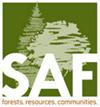成熟的北方红橡树(Quercus rubra L.)的树冠等级转换率
IF 1.5
4区 农林科学
Q2 FORESTRY
引用次数: 0
摘要
1927-1987 年间,每隔 10 年对中等质量地块上 704 棵北方红橡树的树冠等级和直径进行了测量。研究开始时,北方红橡树的名义年龄为 25 岁。25-55 岁之间和 55-85 岁之间的死亡率随着树冠等级的增加而降低(即显性死亡率为 <;隐性死亡率为 <;中间死亡率为 <;抑制)。在 25-55 岁和 55-85 岁之间,树冠等级每增加一级,上升到较高树冠等级的比率就会增加。与 25-55 岁之间相比,55-85 岁之间优势树、同优势树和中间树的死亡率更高。死亡率上升的原因可能是 55 岁以后开始的周期性落叶。在 25 树龄时的几个直径等级中,55 树龄时的存活率和 55 树龄时树冠上层的比例随着树冠等级的增加而增加。萌芽丛中最大的北方红栎在 25-55 岁期间的死亡率低于较小的萌芽和不属于萌芽丛的树木。萌芽丛中最大的红橡树和不属于萌芽丛的红橡树在 55-85 岁之间的树冠位置转换率没有明显差异。然而,萌芽丛中较小的红橡树在 55-85 岁期间的死亡率明显高于萌芽丛中最大的红橡树或不属于萌芽丛的红橡树。树龄为 25 年的受抑制红栎和中生红栎的存活率与优势树冠和同优势树冠的数量呈负相关。树冠等级是确定新英格兰南部成熟北方红橡树未来状况的有力工具。美国《自然》杂志。科学》40(2):221-237.本文章由计算机程序翻译,如有差异,请以英文原文为准。
Crown Class Transition Rates of Maturing Northern Red Oak (Quercus rubra L.)
Crown classes and diameters of 704 northern red oaks on medium quality sites were measured at 10-yr intervals between 1927-1987. Nominal age of northern red oaks at the beginning of the study was 25 yr. Mortality rates between ages 25-55 and between ages 55-85 decreased with each increase in crown class (i.e., mortality of dominant is < codominant is < intermediate is < suppressed). Ascension rates into higher crown classes increased with each increase in crown class between ages 25-55 and between ages 55-85. Mortality rates of dominant, codominant, and intermediate trees were higher between ages 55-85 than between ages 25-55. The cause of the increased mortality was likely periodic episodes of defoliation which began after age 55. Within several diameter classes at age 25, survival through age 55 and the proportion found in upper canopy at age 55 increased with crown class. Mortality rates between ages 25-55 were lower for the largest northern red oak in a sprout clump than for lesser sprouts and for those trees which were not part of a sprout clump. There was no significant difference in canopy position transition rates between ages 55-85 for the largest red oaks in a sprout clump and those trees which were not part of a sprout clump. However, mortality rates between ages 55-85 of lesser trees in a sprout clump were significantly higher than for either the largest sprout in a clump or for those trees which were not part of a sprout clump. Survival of suppressed and intermediate 25-yr-old red oak was negatively related to the number of oaks in dominant and codominant crown classes. Crown class can be a powerful tool for determining the future status of maturing northern red oaks in southern New England. For. Sci. 40(2): 221-237.
求助全文
通过发布文献求助,成功后即可免费获取论文全文。
去求助
来源期刊

Forest Science
农林科学-林学
CiteScore
2.80
自引率
7.10%
发文量
45
审稿时长
3 months
期刊介绍:
Forest Science is a peer-reviewed journal publishing fundamental and applied research that explores all aspects of natural and social sciences as they apply to the function and management of the forested ecosystems of the world. Topics include silviculture, forest management, biometrics, economics, entomology & pathology, fire & fuels management, forest ecology, genetics & tree improvement, geospatial technologies, harvesting & utilization, landscape ecology, operations research, forest policy, physiology, recreation, social sciences, soils & hydrology, and wildlife management.
Forest Science is published bimonthly in February, April, June, August, October, and December.
 求助内容:
求助内容: 应助结果提醒方式:
应助结果提醒方式:


